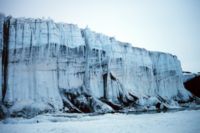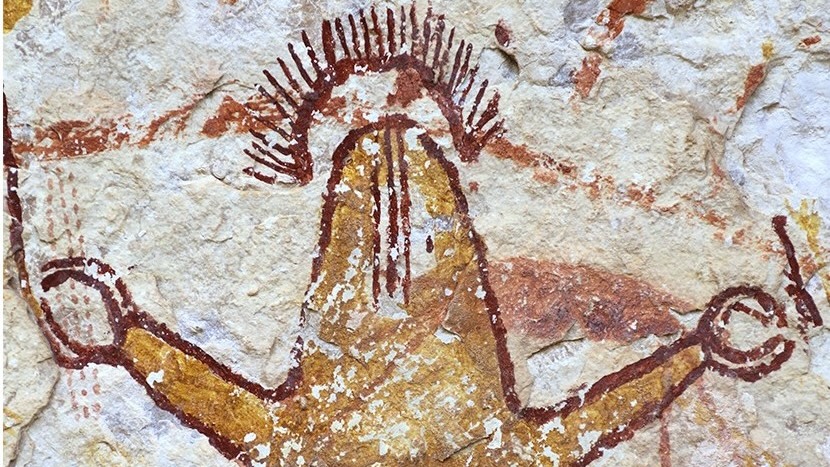How Lowly Bacteria Froze Earth Solid

Earth has been through many cold spells since its birth 4.5 billion years ago. Scientists say some drastic episodes froze the planet all the way to the equator.
Yet these "snowball Earth" scenarios expose a gaping lack of understanding: What caused them?
Lowly bacteria, according to a new study.
In the first and worst snowball episode, 2.3 billion years ago, bacteria suddenly developed the ability to break down water and release oxygen. The influx of oxygen destroyed methane in the atmosphere, which had acted as a blanket to keep the planet warm.
The idea is presented in the latest issue of the Proceedings of the National Academy of Sciences by researchers at Caltech.
In modelling the scenario, the scientists say Earth's exact position from the Sun is the only thing that saved the planet from a permanent deep-freeze.
And, they caution, it could happen again.
Get the world’s most fascinating discoveries delivered straight to your inbox.
Back then
Before the first snowball event, the Sun was only 85 percent as bright as now. But the planet was temperate, much like today. Scientists believe that's because the atmosphere was loaded with methane, a greenhouse gas. It's the same gas used to heat many homes.
Then along came cyanobacteria, which evolved into the first organisms to use water in photosynthesis, releasing oxygen as a byproduct. Scientists had thought the shift might have occured perhaps as far back as 3.8 billion years ago.
But the Caltech scientists searched ancient rocks for clues and found no evidence for the change prior to 2.3 billion years ago.
Here's what they think happened:
A regular old Ice Age set in, and glaciers advanced to middle-latitudes as they would many times in geologic history. When the glaciers retreated back toward the poles, they scoured the land and released abunant nutrients into the oceans.
There were no plants or animals back then. The cyanobacteria, with their newly developed ability to make oxygen, fed off the fresh flow of nutrients, the thinking goes, and their numbers exploded.
And things, well, they snowballed from there.
Minnesota all over
"Their greater range should have allowed the cyanobacteria to come to dominate life on Earth quickly and start releasing large amounts of oxygen," said study team member Robert Kopp, a Caltech graduate student.
Computer modeling shows that most of the atmospheric methane may have been destroyed within 100,000 years, certainly within a several million years. Methane is far more insulating than carbon dioxide, another greenhouse gas.
Global temperatures plummeted to minus 58 Fahrenheit (-50 C). Ice at the equator was a mile thick.
Most organisms died. Biology clung to hydrothermal vents or survived underground, Kopp and his colleagues say. Even today, life has shown itself to be incredibly resilient, eating rocks, swimming in boiling water and enduring thousands of years in the deep freeze.
Then evolution pulled another trick, the scientsits figure. Some of the organisms that did survive adapted to breathe oxygen, now that there was a lot of it.
It was this ability to use oxygen that allowed life to evolve to more complex forms, the scientists say.
Then what?
That leaves the question of how we got out of that frozen mess the bacteria got us into.
Eventually, the scientists say, the changed biology and chemistry caused carbon dioxide to build up enough to generate another greenhouse period. Temperatures climbed to perhaps 122 Fahrenheit (50 C) around the globe, evidence indicates.
"It was a close call to a planetary destruction," says Kopp's supervising professor, Joe Kirschvink. "If Earth had been a bit further from the Sun, the temperature at the poles could have dropped enough to freeze the carbon dioxide into dry ice, robbing us of this greenhouse escape from snowball Earth."
Kirschvink sees a lesson for industrial humans. While a snowball Earth could not develop in a generation and probably not even within a few hundred years, it looms as a long-term possibility.
"We could still go into snowball if we goof up the environment badly enough," he said today.
"We haven't had a snowball in the past 630 million years, and because the Sun is warmer now it may be harder to get into the right condition," Kirschvink said. "But if it ever happens, all life on Earth would likely be destroyed. We could probably get out only by becoming a runaway greenhouse planet like Venus."
Surprising Side Effects of Global Warming
Study: Global Warming Making Hurricanes Stronger
Robert is an independent health and science journalist and writer based in Phoenix, Arizona. He is a former editor-in-chief of Live Science with over 20 years of experience as a reporter and editor. He has worked on websites such as Space.com and Tom's Guide, and is a contributor on Medium, covering how we age and how to optimize the mind and body through time. He has a journalism degree from Humboldt State University in California.


